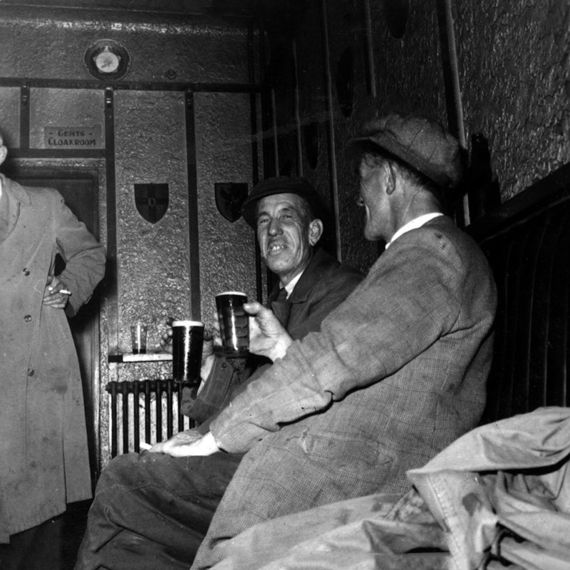You should reserve your scandals for your old age quipped Oscar Wilde once, because that way you can add charm to your golden years
It's advice that the two elderly Irishmen trapped in the grim Hilltop Nursing Home in Dan Mooney's delightful new novel The Great Unexpected (Park Row, $15.99) take to heart, with hilarious and heartbreaking results.
Joel lives in the Hilltop home and he loathes it. His wife, who shared a room with him until she passed away, once made it as welcoming as she could but now she's gone he finds the place intolerable.
It's just an endless hamster wheel of wake up, wash, be fed, swallow some pills, feel depressed, be told when to sleep, repeat. He can't stand it.
To make matters even worse his own family are co-conspirators in his long captivity, a fact that often leads to heated confrontations with his nearest and dearest.
Read more: Is Martin Scorsese's The Irishman all a lie?
Joel doesn't have a soul to confide in about his travails but Mr. Miller, the comatose neighbor in the next bed, who although he doesn't speak makes a terrific listener. But when the medical staff one day attempt a desperate CPR to resuscitate the incapacitated patient, Joel is horrified by what he considers their mistreatment.
His anger curdles into despair and he begins to think of ways leaving this world. That's when Frank De Silby, the one-time actor and man of the theatre, enters his life as a roommate and turns his life upside down.
The story idea for The Great Unexpected came directly from life, Mooney, 32, originally from Limerick, tells IrishCentral.
“I remember when I was about 12 hearing people saying that my grandfather had gangrene in one of his legs and that the doctors were going to have to take it, but before they did he suffered a pulmonary embolism and he died.”

Irish author Dan Mooney
Hearing his aunts and uncles talking about it afterwards Mooney remembers them saying that he was probably better off dead than to be suffering like that, with his independence and his ability to look after himself gone, and being the kind of man he was he would probably have preferred death than not to be in charge of himself.
That's all very well if you're not the person in the bed, thought Mooney. But how does your perspective change then?
“My grandfather was a very resourceful man. So the idea that nobody could fathom a world in which he didn't have his independence stuck with me for years and years. The way he passed also made a huge impression on me too. He was having a conversation with a nurse, who turned around to adjust the patient in the next bed. When she turned back to him there was silence, he'd stopped speaking."
"It was absolutely like nothing happened. He just died. There he was one second sitting up on the bed and being asked if he wanted a cup of tea and then he was gone. And I think those two are the kind of moments that make us wonder what it was all for?”
Those two events became linked in Mooney's head, he says. “The message is that you may as well enjoy what time you have because you could be gone at any second and the older you get, the more likely it is that that second is coming. And so that's kind of Joel's philosophy of life in the book.”

Being cranky after his wife's passing and after Mr. Miller's sad end, his independence has been lost and without it, he just doesn't see a value in life. “Those two moments come directly from my grandparent's life and they formed the genesis of idea for the story,” he explains.
Mooney has an unusual job for a full-time writer. Between writing chapters, he's likely monitoring your next flight to Ireland and back as an air traffic controller. “I work outside Shannon town,” he explains.
“We are not actually at the airport, we are at the control center. It's all radar controlling. From here we can see anything that any plane that is Europe and going to the states, or from the states going into Europe. At some point, they have to pass to us. 90% of the transatlantic traffic come through our air space during the summertime, that might be 1700 airplanes a day and every 24 hours.”
It's fascinating to hear that he works full time as an air traffic controller whilst also writing acclaimed books and also finding time to act (next up he's playing Owen in Brian Friel's Translations) as well as being a devoted rugby commentator!
Meanwhile what's so interesting about the dynamic of The Great Unexpected is that Mooney's picked up on changes that are happening in the larger Irish culture. Many people have asked why the Irish marriage referendum was so successful, for example. Was it because the country made the same journey that Joel does in the book, out of a suffocating and insular way of life that is literally killing him, toward a new measure of honesty and acceptance?

“That's it. Frank in the book has this chipper, happy go lucky personality but he lives with tremendous personal regret. When he sees the young nurse Liam who's obviously comfortable with himself as a gay man it's just a thing he never had himself. In Frank's case, it's because of that Irish thing that's so dispiriting, that we must all be one way and we must all walk in the one line and this is who we all are. And so even though Frank is this very gregarious outgoing guy, he's still a very much a victim of Irish history.”
Is it because we had a hundred years of stoic Irish men and patriarchal religious institutions choking the life out of us that we actually learned that it's not healthy to live in this kind of buttoned-up way?
The story you wrote suggests to me that in order to become a complete person you've got to embrace all the various aspects of who you are. Is that right?
“The friendship between the two unlikely men broadens Joel's world, it liberates him quite a bit, allows him to be a different version of himself, a version that that isn't so constantly threatened by everything and everyone. In a way, their friendship rescues them both, allows them to finally grow up.”
The Great Unexpected (Park Row, $15.99)
Read more: The most dangerous book in Ireland




Comments